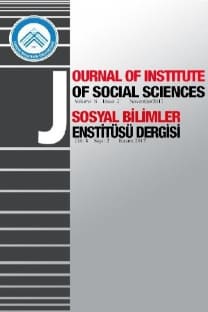Siyaset Kültürümüzde Ahde Vefâ ve Nakz-i Ahd
Ahde Vefâ and Nakz-i Ahd in our Political Culture
Culture of Politics, Ahde Vefâ, Nakz-i Ahd, Diplomacy Pacta Sunt Servanda,
___
- Kaynak Eserler
- Feridun Bey, Münşeatü’s-Selâtin, C.II, İstanbul, 1275 Kitaplar
- Ebû Sehl Nu’mân Efendi, Tedbîrât-ı Pesendîde, Yayına Hazırlayan: Ali İbrahim Savaş, TTK, Ankara, 1999.
- Aksar, Y (2012). Teoride ve Uygulamada Uluslararası Hukuk I, Seçkin Yayıncılık, Ankara.
- Sander, O. (2000). Anka’nın Yükselişi ve Düşüşü, İmge Kitabevi, Ankara. Makaleler
- Öztürk, N. (2013). “15. yy Osmanlı Kroniklerinde And/Yemin Kayıtları” Acta Turcica, sayı 2.
- Sarıkaya, M.S. “Dini ve Siyasi Bakımdan Osmanlı-İran Münasebetleri”, Türk Kültürü, Sayı 363, Yıl XXXI
- Savaş, A.İ. (1996). “Osmanlı Diplomatikasına Ait Nâme-i Hümâyûn, Ahidnâme-i Hümâyûn ve Mektup Tahlilleri”, OTAM, sayı:7, Ankara.
- Türkdoğan, M.G. (2010). “Siyasetnâmeler ve Bir Siyasetnâme Örneği Olarak Ahmedî’nin İskendernâmesi”, Uluslararası Sosyal Araştırmalar Dergisi, c. III. İnternet Adresleri www.diyanet.gov.tr
- www.judicialmonitor.org
- www.mpil.de/files/pdf3/beitr2452.pdf
- ISSN: 1309-3738
- Yayın Aralığı: 2
- Başlangıç: 2010
- Yayıncı: Prof. Dr. Coşkun POLAT
Tarih İçinde Müslüman Türk Tip(ler)i ve Hacı Murâd-ı Velî
Türkiyedeki Vakıf Üniversitelerinin Eğitim Faaliyetlerinin Mevcut Durumunun Araştırılması
Türkiye’de Yaşayan Çerkeslerin Anadilde Eğitim Sorunlarının Sosyal Çözülme Doğrultusunda Analizi
Şaman Davulu Dinlemenin Ruhsal Duruma Etkisi
Ali Maruf ALASKAN, Ayşegül BİLGE, Çağnur ŞARMAN
Örgütsel Ölüm: Adaptasyon Teorileri Bağlamında Bir Değerlendirme
Sevdiye ERSOY YILMAZ, Emine ÇETİNEL
Dîvâne Mehmed Çelebi’nin Müseddesi ve Müseddese Yapılan Tazminler Üzerine
Rafet GÜNAY, Hasan AYDIN, Fadime KOÇ DAMGACI
Örgütsel Etik Davranışlar: Bir Araştırma
Tokat İlinde Orman Ürünleri Endüstrisinin Mevcut Durumu, Sorunları ve Çözüm Önerileri
